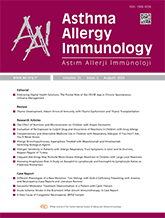


Objective: Patients diagnosed with drug allergy should be carefully instructed to avoid using the culprit drug and provided with drug allergy passports to alert healthcare providers. However, accidental re-exposure to the offending drug may occur. To determine the rate of re-exposure to culprit drugs in patients diagnosed with drug allergy and the characteristics of reactions they experienced.
Materials and Methods: Patients who were diagnosed with drug allergy confirmed with diagnostic tests in the Pediatric Allergy Clinic between 2010 and 2020 were contacted by phone to obtain information on re-exposure to the offending drug after diagnosis and to determine whether the drug reuse was associated with any reaction.
Results: A total of 92 patients with confirmed drug allergy who were contacted by phone were included in the study. The mean age of the study patients was 152 months (range, 108-204) and 54.3% (n=50) of the patients were female. Culprit drugs were antibiotics in 68.5% (n=63), NSAIDs in 23.9% (n=22), antiepileptics in 4.3% (n=4), and other drugs in 3.3% (n=3) of the patients. All of the patients reported that they carry a drug allergy passport at all times and informed the physician about their drug allergy during an examination. Three of the study patients were re-exposed to the culprit drug and two of them had developed a reaction. One had urticaria and the other experienced anaphylaxis after re-exposure.
Conclusion: Patients with confirmed drug allergy should be advised to avoid re-exposure to the culprit drug and to carry their drug allergy passports at all times to alert physicians when they are prescribing a drug treatment.